
25 minute read
Dominican Responds to COVID-19
Reflections in a Time of Crisis
By President Mary B. Marcy
In the months since our world suddenly changed, the Dominican community has pulled together in ways that highlight both our strength and our humanity. If we were to adopt a fifth pillar to sit alongside our enduring values of community, service, study and reflection, it surely would be resilience. As we end an academic year like no other, there is value in the tradition of taking stock. I am fortunate to lead a campus with a strong mission and a community of faculty and staff that share a deep commitment to student success. Our work creating a “new normal” this spring was focused on one thing: helping our students continue to reach their educational goals in as safe and equitable an environment as possible. The creativity, adaptability, and yes, the resilience of our faculty and staff has been remarkable. A few highlights from an unusual spring semester:
Our health sciences students were faced with limits on their ability to complete their clinical work and graduate on time. In response, our Department of Nursing secured approval for senior nursing students to meet clinical requirements by providing one-on-one telehealth support to elderly and at-risk clients through our ongoing partnership with West Marin Senior Services (WMSS). Led by Dr. Ellen Christiansen, our students were paired with WMSS clients on regular calls addressing nursing, health and social issues. In our Occupational Therapy Department, Dr. Gina Tucker-Roghi adapted a course to allow her students to work with clients of the local nonprofit organization Marin Villages. Students and clients created “Personal Life Profiles” that will help personalize care should their clients become unable to speak for themselves. In our Education Department, Dr. Katie Lewis and Dr. Rebecca Birch provided resources on ways parents can work with their children during remote access. In the Barowsky School of Business, Dr. Jacob Massoud engaged his Entrepreneurship & Strategic Management students by providing real-time feedback on student business plans and simulation projects using cloud-based software platforms. A newly established Student Success Working Group — staffed by personnel in the Student Success Center and Student Life — began working online and remotely to provide support and guidance to students. In addition to academic guidance and support, we developed opportunities for students to engage with their peers and communities — albeit virtually — to foster interaction and promote well-being. Of course, this being Dominican, our campus community was quick to respond to the needs of our greater community. When we heard that local hospitals needed vital PPE equipment, we donated more than 750 masks and other PPE supplies to Marin Public Health to distribute where the need was greatest. We also donated more than 1,000 test tubes and swabs urgently needed for COVID testing. Within hours of Governor Gavin Newsom announcing the California Healthcare Corps, more than 100 of our nursing students signed up to volunteer in our county hospitals. In partnership with the Marin County Office of Education, our Education Department has developed free programs to help K-12 teachers improve their online teaching skills, which have now reached hundreds of teachers. When the Red Cross asked if they could hold a blood drive on campus, we gave them full access to the Conlan Center for a day-long blood drive. Appointment slots filled within hours. We are providing housing support for our community partners — mainly first responders and medical staff who have a need for temporary housing.
Together, our campus community continues to learn how to live out our Dominican Values in a new way. Our online and remote work does not change the nature of our community, or lessen the value of our mission. Our work remains guided by our commitment to the Dominican Experience, our transformative educational model that prepares every student for a complex, diverse, and rapidly changing world. Dominican was founded 130 years ago on little more than faith, a belief in education, and a good eye for real estate. It was decades before we conferred our first degree. We have conferred thousands of degrees since, and we will confer thousands in future years. We will work through this challenge together. I have tremendous confidence in the values, integrity, and significance of the Dominican community. Please take care of yourselves and your loved ones, and know that, although it is temporarily in a virtual space, our community and our work continues.
Compassionate MBA Student Means Business During COVID Crisis
Nhan Pham ’19 has his hands full lately as he pursues his MBA in Healthcare Leadership. He is answering the hotline at the COVID-19 Call Center in Marin County while continuing his work as a support service worker and case manager for the county’s Behavioral, Recovery, Integrated and Dedicated to Growth and Excellence (BRIDGE) program. How does he do it? “Communication and compassion are skills I learned from Dominican that are helping me navigate through work and school,” he says. Pham started working full time in Health and Human Services in Marin last December, seven months after he received his undergraduate degree from the Barowsky School of Business. He had interned for Behavioral Health and Recovery Services of Marin in the spring of 2019 as part of his Community Action and Social Change (CASC) minor through the Service-Learning Program and that led to him being recommended for a position with the BRIDGE program because of his involvement with the Vietnamese community and his knowledge of mental health issues.
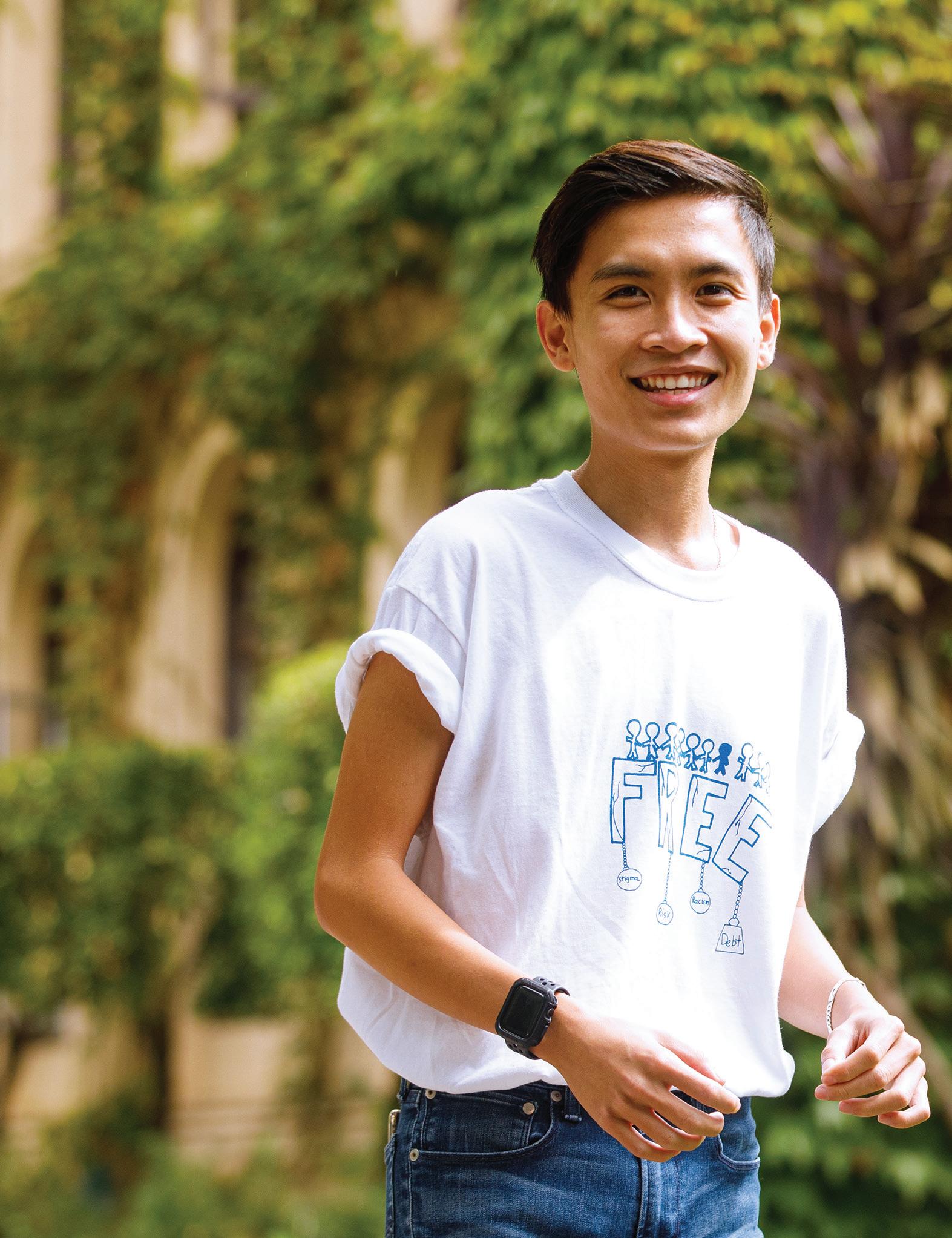
When the spread of the Coronavirus started making in-roads to Marin County in March, Pham was asked to answer questions, provide resources, and listen to concerns from community members on the call line, in addition to performing his normal duties at BRIDGE of checking in with his clients, providing outreach to new clients, and supporting his clients during the pandemic. Meanwhile, Pham has stayed on track toward completing his MBA this summer. “I am able to manage my work with the Call Center and BRIDGE plus school because it is very rewarding,” Pham says. “Working at the Call Center is rewarding for me because I can be a part of the workforce who is helping the community during this pandemic. Working at BRIDGE is fulfilling because I am a part of the recovery journey of my clients, who are struggling with mental health. Working on finishing my MBA in healthcare policy is enriching because I am able to work toward a goal that I have always wanted to accomplish and use the degree to enrich other people’s lives.” Transferring to Dominican halfway through his freshman year was a transformative decision that set Pham on a path toward leadership roles both on and off campus with internships that nurtured his interests in the world of business and global learning opportunities that expanded both his personal and professional network. Pham, a graduate of Santa Rosa’s Elsie Allen High School, transferred to Dominican after spending his first semester attending a liberal arts college in Pennsylvania. “I realized that it was important for me to study somewhere that was closer to home and closer to where I want to eventually work and live,” he says about his decision to transfer to Dominican. Almost immediately after arriving as a freshman, Pham immersed himself in both the Dominican and Marin County communities. Enrolling in a Service-Learning course freshman year he says was a game-changer. “The Service-Learning program gave me purpose in my college career,” Pham says. “I learned how to be a leader in our community, I learned how to speak up for people in the community, and most importantly I made connections through the programs of several community partners.” Pham first service-learning opportunity was working with the Canal Alliance, a local nonprofit that works on behalf of immigrants challenged by a lack of resources and an unfamiliar environment. He started with Canal Alliance's English as a Second Language (ESL) program, where he had his first exposure to the multicultural immigrant community in San Rafael. After working with the adults, his second semester with Canal Alliance provided him with an understanding of the younger members of the Canal immigrant community through its University Prep (UP!) program. Besides Canal Alliance, Pham also worked with Health Hubs, a food distribution and health advocacy program coordinated by Marin Community Clinics. He gained a deeper awareness of the daily challenges of immigrant families in this county — not only cultural and linguistic challenges, but also the gaps toward families having adequate nutritional support and healthcare access. In his senior year, Pham did an internship with Marin Asian Advocacy Project, a non-profit that has been providing social services for the local Asian community for the last two decades. An immigrant to the United States from Vietnam with his parents, Pham was instrumental in helping to organize a weekly social gathering for Vietnamese elders in San Rafael. The relationships he built with the elders, and the conversations he had with them, changed his perception of his own ethnic community. “I realized that many of the people in Marin’s Vietnamese community experienced social isolation — even after being here for many years,” Pham says. “My experiences were different. It is sad to look at your own community and realize isolation is an issue, living in poverty is an issue, and finding support is an issue.” His experiences in the Service-Learning program led Pham to the CASC minor. “I gained so much from these experiences. I learned how to be a compassionate and understanding person.” Inside the classroom, he says he has appreciated the mentorship of several faculty in the Barowsky School of Business, particularly Dr. Christopher Leeds.
“Dr. Leeds taught me so much about how to write and communicate in a business setting. He taught me how to give a presentation — about the flow of your message and how to speak in public.” With a busy schedule, the business student also gained leadership experience through internships and on-campus leadership positions. A marketing internship with HealthNet gave him insight into many facets of marketing, from brand image to effective communication. An internship with the Rafael Racquet Club taught him how to be an independent leader in a much smaller organization. Working as an RA and RA liaison to ASDU taught him how to communicate with students, peers, friends, and coworkers with humility and respect. In his junior year Pham studied business at Nord University in Norway through Dominican’s Global Education Office. This exposure to global business is serving him well as he continues his studies in Dominican’s MBA program. “Dominican is a dream made possible because of this diverse community,” Pham says. “I am a first-generation immigrant student who studied abroad, was an RA, was a part of student government, and has a major and a minor. Without this community, I would not have had any of these experiences.”
The Dominican Community on The Front Lines
Members of the Dominican community working in education, nursing, medicine, and science share how the COVID-19 pandemic has impacted their work and their lives, and offer tips for navigating our new normal.
Katie Lewis, PhD
Assistant Professor of Education and Director of Multiple Subject Credential Program
Rebecca Birch, EdD
Assistant Professor of Education and Director of Single Subject Credential Program C onsidering the nature of this abrupt change (i.e., a pandemic of disease, fear, uncertainty, and grief), we believe that a trauma-informed approach to teaching and learning is most appropriate. Trauma is an exceptional experience in which powerful and dangerous events overwhelm a person’s capacity to cope. We all have different capacities to cope with sudden changes in our lives and this approach recognizes the many ways people react to and interpret lived experiences. In other words, trauma-informed teaching and learning is about acknowledging that trauma is real and affects our lives and that each of our students will cope in different ways. Families across the nation are adapting to the evolving changes in daily life caused by the COVID-19 crisis. Teachers are learning to navigate the challenge of quickly transitioning to online learning. Parents are faced with assisting their families to adjust to the new normal. This is not an easy task, but it helps to stay focused on what is possible in order to reinforce a sense of control for students and families. In taking a trauma-informed approach, we prioritize relationships and well-being, establish clear routines and communication, and embrace student-driven assignments.
Lynn Sondag, MFA
Associate Professor of Art; Honors Program Director
Foremost on our minds is how to make the now virtual classroom learning experience as accessible, positive, and successful as possible. Students in my class are 100 percent on board to help make this happen. Within 24 hours of mailing packages of supplies, I welcomed email responses such as, “I’ve received the materials and am excited to get started on my assignments!” In the first synchronous class, all students joined Zoom on time with full participation. My service-learning course, “Art Fundamentals: Concept to Creation,” is designed to explore what the arts teach and how the arts are an integral part of educational equity. And now more than ever, there’s a unique opportunity to delve into both of these issues. Students enrolled in this class are pursuing degrees in education, nursing, psychology, and pre-med. My hope is that despite this sudden disruption, or even because of it, the course will provide opportunities for students to reflect on the numerous benefits of art and creative expression, and who has access to these benefits. Students are diligently working on their assignments at home and sending jpegs of work in progress for feedback. One nurse shared this message: “I’m finding working on my creative assignment very therapeutic.’”
Due to the necessary focus on Coronavirus, I am concerned that we may see a significant resurgence in malaria morbidity and mortalRoland Cooper, PhD ity in the coming year in Africa, wiping out some of the gains that were made over the last decade to reduce the burden of this disease. Currently, our Professor, Natural Sciences and Mathematics long-term malaria field studies have come to a grinding halt with the shelterin-place orders in Uganda and Burkina Faso. Keeping families together in tight quarters indoors could result in increased malaria transmission, as the mosquitoes that transmit the disease are indoor feeders. Also, nobody knows what a co-infection with both pathogens will look like. Interventions for malaria such as bednet distribution and spraying households against mosquitoes are expensive endeavors that may be side-tracked as governments need to invest their limited resources in strategies to mitigate COVID-19 effects. This is a hold-your-breath moment for sub-Saharan Africa.
Dr. Elicia Fernandez, ’13
Resident Physician, UCSF Fresno Psychiatry Residency Program
This pandemic has impacted my training in that in order to comply with social distancing guidelines, we have transitioned to telehealth visits. Before we had set up the telehealth technology, we completed visits over the phone. This is forcing us to adapt to a new way of approaching mental health care. Telehealth is already an emerging method of delivering psychiatric care, but this pandemic forced us to implement it when we may not have done so quite yet. I can also say that this pandemic is significantly affecting my patients. The response to this virus has impacted our lives and is causing a significant amount of stress for everyone, particularly those who are already predisposed to anxiety, depression, or other mental health issues. It's difficult to know how to soothe someone else when we ourselves are also living in a state of uncertainty.
When COVID-19 first began to look like it would be a pandemic here in the U.S., several things at my hospital/residency happened all Dr. LCPT K. Tasha at once. The credentialing body for Family Medicine/GME relaxed requirements for graduation (i.e., the number of patients in clinic we need to Pellegrini, ’11 see; the number of babies we have to deliver) to allow us to respond to the Third-year Resident, Family Medicine and Captain in the U.S. Army Medical Department pandemic. All the residents have been assigned to contingency operations on the inpatient wards — day and night — to cover COVID and sick-but-not-COVID patients. Those of us who cannot take care of those patients (e.g. pregnant or elderly staff), have been assigned to "clean" clinics to take care of our well or non-COVID-sick elderly and our OB patients. Many of the specialty clinics have closed until at least April, and possibly longer. I've already been quarantined after exposure to a potentially positive patient. Daycares have been reduced to "mission essential personnel" only, and everyone is expected to be able to work from home. Travel further than 50 miles outside of the city is prohibited, and all of our pending assignments this summer (which we call PCS in the military) have been placed on hold. Though once we graduate...I wouldn't be surprised if we got sent all over to support our civilian brothers and sisters during this time of crisis. What have I learned? Family medicine is highly adaptable and in high demand in the hospital because we're the most comfortable with the most challenging things. I have colleagues in other specialties who haven't touched a mechanically ventilated patient in years, and though I don't pretend to be anywhere near a critical care expert, I'm not frightened of a vent. Less flattering things? I've learned that I'm worried about going to work and bringing home this virus to my family. That working from home is monstrously difficult. That I feel guilty when people thank me profusely when I haven't really done anything yet, other than my job.
Jan Ashley Escosio
First-year Nursing Student
Although my time on campus this semester was cut short due to the pandemic, I have seen this experience as an opportunity to teach me to be flexible, adapt, and remain calm under stressful and confusing situations. I believe that these traits are important for every nurse to have because they cannot be taught and are instead learned through experience. Now, more than ever, I see the amazing resilience, strength, courage, and compassion nurses and all of the medical frontliners display. Transitioning to online learning was very challenging. Throughout my academic journey, I have been accustomed to learning in a classroom environment where I got to establish relationships with my teachers and my peers. It is the environment where I best learn and focus. I have grown used to a life of school where I learned and my home/dorm was the place I would do homework, study, and relax. Through online learning, I lost that separation, which at times was kind of stressful. However, I think online learning helped me grow as a student and a person because it helped me become my own source of motivation and discipline when it comes to learning and taking breaks. I realized how vital it is to know how our actions have greater effects outside of ourselves. More importantly, I've learned to live with an attitude of gratitude, realizing that it's the simple things in life that makes it beautiful and special. I'm especially grateful for all of my professors who always check up on us, make sure that we are okay physically and emotionally, are easy to communicate and get in touch with, and adjust the curriculum to fit our learning needs and personal circumstances. I am also extremely grateful for technology because it allows me to maintain communication with my friends. Having Zoom meetings, texting, FaceTiming, or messaging them through Instagram are the main ways that I am able to keep in touch with them, creating as close a sense of normalcy as possible. Although this is a challenging time for all of us, I hope we can see it all as a time to better ourselves to be selfless, strong, and loving people.
Iceland Field Trip Adventures
It was early in the morning on March 11 — just before a group of students and faculty were ready to start the journey to Akureyri, the Capital of North Iceland — that biology professor Dr. Vania Coelho received urgent emails from President Mary B. Marcy and Global Education Office Director Kati Bell. “The emails said that the United States was going to start restricting flights from Europe in the next few days, but we were assured that the University was already doing everything it could to make sure that we would be okay,” Coelho recalls. When the group of 13 left in early March to study biodiversity and sustainability issues in Iceland, coronavirus was a slowly growing but still faraway concern. “We really did not think it was an issue at the time; although, many of us believed that it could become an issue in a few months,” Dr. Coelho says. When they arrived in Iceland, the group quickly embarked on a busy schedule touring natural sites and meeting with local experts. Each evening, when they arrived back at their hotel following dinner, they were too tired to tune into the news. The hotel’s spotty Internet also made online surfing all that much harder. “We were so busy visiting wonderful sites and hearing about how Iceland was tackling issues related to global climate change,” Coelho says. “Many of us really didn’t have time to go onto the internet to read the news — we were exhausted!” From orca sightings to exploring ice caves located within glaciers, the group spent their days learning about the country’s beautiful, but harsh, landscape. They also witnessed climate change in action when visiting Diamond Beach, a strip of black volcanic sand along the Jökulsárlón glacier lagoon on the South Coast of Iceland. “We saw how the melting of the glacier creates small icebergs across the lagoon that connect out to the ocean,” Coelho recalls. Many icebergs had washed up on the shore, creating a contrast with the black sand. “It was an out-of-this-world sight to see. Just amazing and stunning.” Political science major Julia Reinhard ’22 says visiting the glaciers helped her better understand the fragility of ecosystems in Iceland and around the world. “Two of my favorite highlights were when we walked on the Mýrdalsjökull glacier and when we explored ice caves located on the Breiðamerkurjökull glacier,” Julia recalls. “These memories stand out to me because they were unique experiences that illuminated the need for bold climate change mitigation efforts to not only save Iceland’s glaciers, but to preserve fragile ecosystems around the globe.” The visit to Iceland was a field trip component of a semester-long course, BIO 3505 International Field Biology, in which the students examine many issues facing Iceland, from local biodiversity threats, to problems with salmon farming, over-tourism and whale hunting, among others. “Iceland is the perfect place to learn about important global events,” says Coelho. “They are tackling so many issues on a grand scale, from past deforestation and their difficulty in remediating this issue to the challenges they face preserving native species in an environment particularly sensitive to climate change.” During their visits, the Dominican group stayed together and observed self-protection — washing hands and using hand sanitizer and everyone on the trip remained healthy and in good spirits. “Toward the end of our trip, when I received the emails from Dominican, I was able to tell all the students that we were going to be just fine — and that the University had our backs. Everyone remained calm, and no one panicked, as we knew we were in good hands.” The return trip was largely uneventful. However, being met at the airport by officials in Seattle wearing hazmat suits was jarring. “They were checking for people showing symptoms — fever or cough. Luckily, no one on our flight had a cough — that’s actually really unusual for this time of year!” The group immediately went into isolation upon return, giving Coelho time to switch her in-person coursework to online delivery when the spring semester resumed on March 23. “I feel really fortunate and thankful that our group had such a marvelous learning experience and felt very supported by the university, knowing that Dominican had really stepped up to offer support,” Coelho remarked.

Alumna on the frontline of COVID-19 crisis as an ICU Doctor
are sharing information and resources, coming up with solutions to urgent problems and, despite the disruption caused by COVID-19, sharing insights and reflections. Dominican alumna Dr. Ashley Rubin ’11 reconnected with one of her Dominican faculty mentors, Julia van der Ryn, via social media, where they reminisced about their shared time at Dominican. Rubin is now an Intensive Care Unit (ICU) physician at Methodist Hospital in Sacramento, while van der Ryn is the executive director of Dominican’s Center for Community Engagement. Rubin shared what she appreciates about working on the frontline of the COVID-19 epidemic in her social media post. She said she is “thankful to be working in the ICU/first-line medicine work during such a crazy time for medicine. I’m seeing things we couldn’t have imagined in America. Learning new things daily.” Rubin also remarked that these times also brought “a pleasant reminder of the amazing family and friends I am blessed to have in my life that are constantly supporting and loving me.” Van der Ryn immediately praised her inspiring words and important work. To which Rubin replied: “I am who I am because of the people that blessed and inspired me with love, knowledge, and compassion. I still have all of the books I bought for your class and those times inspired me to be who I am as a doctor and woman. Thank you for inspiring [other] young me’s in the world.” At Dominican, Rubin felt a strong desire to help others throughout her education. As a biology major in the School of Health and Natural Sciences, she made humanitarian trips and medical missions during winter and summer breaks to assist people all around the world. In her junior year, while she was studying biology in Sweden, she made a side trip to the North Pole.

Rubin’s travels took her to Panama, Ecuador, Mexico, Guatemala, Jamaica, Botswana, Zambia, Zimbabwe, Egypt, and places all across the U.S. working on projects such as building huts, HIV/AIDS awareness programs, water purification seminars, or providing food and water to
In this time of crisis, people are connecting more than ever — from a safe distance via social media. They third-world countries.
She also worked in collaboration with the National Park Service on various projects, including the Marine Ecosystem of Pearl Harbor in Hawaii. During an interview with The Torch magazine in 2011, Rubin said, “This is my focus in life — to be with people I’ve never met or heard of and help them.” After Dominican — and with a hearty letter of recommendation from van der Ryn — Rubin enrolled in the MS in Global Public Health program at the University of California San Francisco. She then earned her DO from The West Virginia School of Osteopathic Medicine. “She was an amazing student,” van der Ryn said. “She continues to be an amazing doctor.”
DOMINICAN COVID-19 TIMELINE
DEC. 31 , 2019
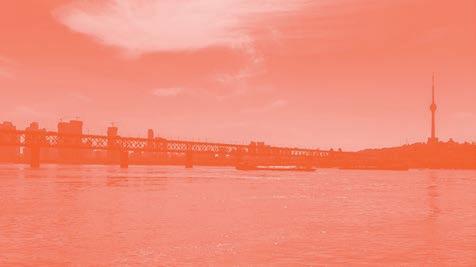
A virus of unknown origin in Wuhan, China is first reported to the World Health Organization (WHO) office in China.
JAN. 30 , 2020
WHO declares the coronavirus a public health emergency of international concern.
FEB. 11 , 2020
WHO announces a name for the new coronavirus disease: COVID-19.
MAR. 17 , 2020
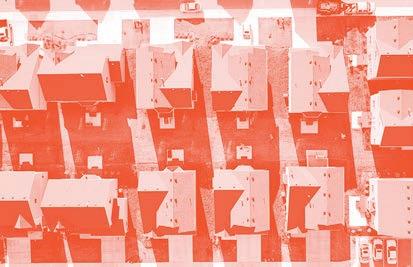
A “shelter-in-place” order is issued for Marin County and other Bay Area counties.
MAR. 19 , 2020
Governor Gavin Newsom announces a “stay at home” order for the entire State of California.
MAR. 20 , 2020
Dominican donates 750 N-95 masks and 1,000 sterile 15-milliliter tubes needed for COVID-19 testing, and additional protective equipment supplies to Marin Public Health.
APR. 7 , 2020 8
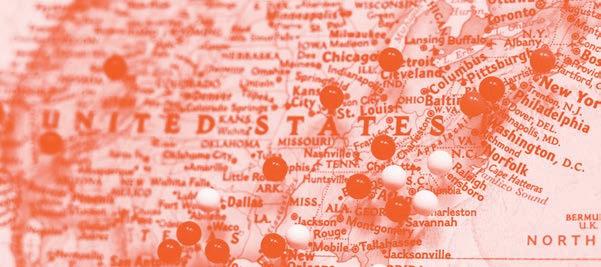
THE TORCH | SPRING 2020
Approximately 95 percent of all Americans are under some form of lockdown as a result of state, county, or city orders.
APR. 8 , 2020
Dominican co-sponsors a Red Cross blood drive in the Conlan Center to help maintain a sufficient supply of blood for the community.
MAR. 9 , 2020

Marin County reports its first case of COVID-19.
MAR. 26 , 2020
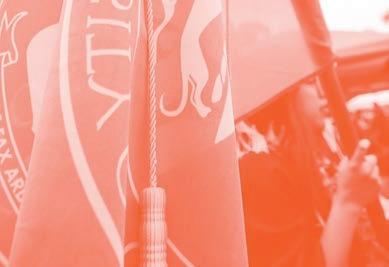
President Marcy announces that Dominincan will offer two Commencement events — a virtual celebration on May 16, and an in-person event in the fall of 2020.
MAR. 13 , 2020
President Mary B. Marcy announces that all classes that can be taught remotely will move to online course delivery for the duration of the emergency.
MAR. 16 , 2020
The Pacific West Conference cancels the remainder of its conference and all athleticrelated activities through the end of the spring national championships.
MAR. 26 , 2020
President Marcy announces that the remainder of the spring 2020 term will be completed via online course delivery.
APR. 3 , 2020

Dominican partners with the County of Marin to set aside dorm rooms for first responders who need to quarantine apart from their families.

